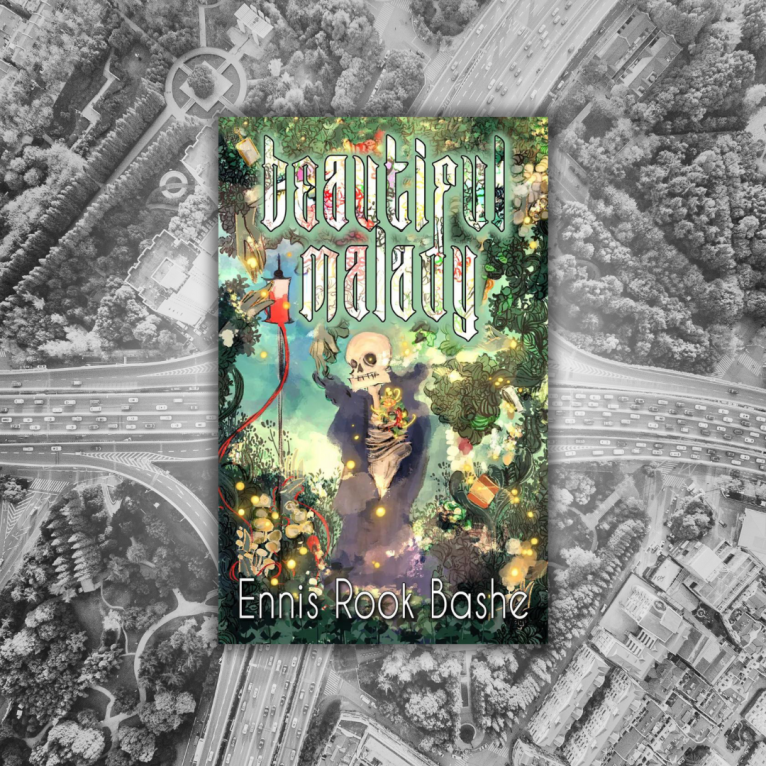Review: Beautiful Malady by Ennis Rook Bashe
When Beautiful Malady by Ennis Rook Bashe popped up in my Twitter feed with that gorgeously maximalist cover, I knew I had to have it. I’ve been on a bit of a poetry kick lately, mainly focusing on works by queer and/or disabled poets, and this little gem had the added wonder of being spun together with speculative elements, itching at my extremely nerdy needs. So I took myself over to Netgalley and did the whole sign up thing to get myself an ARC. And, after having read only a handful of poems from the collection, I added Beautiful Malady straight onto to all of my wishlists (gifts marked for myself and others). I knew then that this was a book that I would very much need a physical copy of to fawn over, and that I would also want to talk endlessly about with other humans.Beautiful Malady is a striking in depth look into what it is to be disabled; to live in a body that doesn’t always want to live with you. It sculpts very real moments of both difficulty and joy with brilliant flashes of fantasy that will leave you breathless with feeling.
In short, it’s the type of poetry I some day hope to write myself.
Bashe’s weaving of speculative elements with the reality of disability is seriously that good. I’m sure a lot of reviewers will talk about the robots or the ghosts (in fact, I probably will later, too), but my personal favourite example of Bashe’s masterful use of the speculative genre was the echoes of Frankenstein and witchcraft spun into ‘Mad, Without Scientist’:
I mean if they think you’re a curse.
If you have to scrawl on the walls in blood
at least write equations.
That comparison of disability with a magical blood curse conjures up those moments of living with disability where you feel like a burden, but with a dash of knowing, cruel wit in the follow up nod to the notion that the only thing disabled people are allowed to do with their disability is be inspiring. It mocks that uneasy pressure that we live with to turn our ‘misfortune’ into something constructive, rather than acknowledge that it’s not easy, that there are things we cannot do, or should not be expected to do. The meshing of genre elements with the real is impeccable.
And I think that trail of perfection stems, in part, from Bashe’s skill at making a simple image hit deeply. They manage to make the fantastical relatable by giving surreal scenarios and creatures simple language, and in turn make the real feel absurd. In ‘On Having Had Wings’, in which a once winged being complains of being wingless you get this gem:
[…] Do
you like hauling
your whole solid self everywhere?”
When I tell you that, as a disabled person, I felt that question in my heavy-ass bones. It’s so simple, gently disrupting our perception of reality for the briefest of moments by questioning a thing we do every day. But it lifts you off the ground and then sends you crashing back down in an instant. I’m a little obsessed, in case you can’t tell.
I also loved how this collection managed to avoid the usual pitfall of being one note. There’s darkness and gloom in Beautiful Malady, but also hope and humour and sweetness. And now I will talk about the robots because how freaking cute is, “Every giant robot would adore/ the ones who use machines to live.” (‘Alternate Mode: Mobility Aid’)? It conjures up feelings of nostalgia and comfort, and I’m not going to lie, all I can picture is the Iron Giant reaching down a finger to cuddle.
I could go on and on and on about Beautiful Malady. I could talk about having my own golden-eyed ‘Pain Son’ and how I too want to kiss myself on the head and go soaring (‘Rose Ghost II’), but instead, I’m just going to drop the link to buy the collection here, and wish you all a happy Queer Pride, and a Happy Disability Pride too ❤

